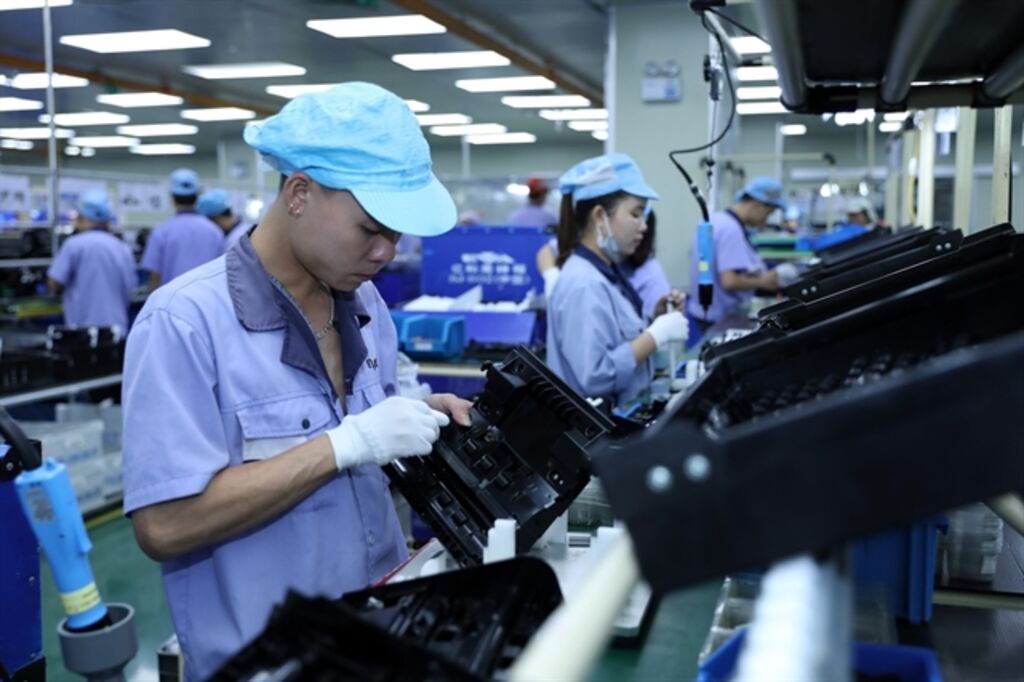 |
| Electronic components for office machines are manufactured at Hong Kong (China)-invested EVA Precision Industry Co. in Hai Phong__Photo: VNA |
Vietnam is experiencing a significant surge in foreign investment in its processing and manufacturing industry, a trend that experts say is enhancing the country’s production capacity and contributing to overall economic growth.
In August 2025, several major foreign-invested projects were granted licenses, highlighting the sector’s attractiveness to global investors. Notably, a USD 300 million smartphone manufacturing project in Bac Ninh was approved, along with a USD 207 million initiative in Hai Phong focused on manufacturing, assembling and developing high-voltage direct current and high-performance alternating current transformers.
Meanwhile, several ongoing projects in the processing and manufacturing sector increased their capital in August. Among the most notable was a synthetic fiber project serving the automotive and other industries, financed by Hailide Fibers (Hong Kong). The company raised its investment by USD 200 million, bringing total capital at its Tay Ninh facility to USD 335 million.
These projects contributed to the processing and manufacturing sector maintaining its lead in attracting foreign investment in August. Total foreign investment in the sector reached USD 1.6 billion, accounting for 76.5 percent of all registered investment in Vietnam that month.
Experts note that despite shifting investor interests over nearly four decades - from real estate and banking to retail- foreign investment in the processing and manufacturing industry has consistently held the leading position.
In recent years, the trend has evolved further, with Vietnam attracting increasingly large-scale, high-tech investments in advanced sectors such as electronics and semiconductors - industries at the forefront of global innovation.
Data from the Foreign Investment Agency under the Ministry of Finance reveals that the processing and manufacturing industry has thus far lured a cumulative USD 320.7 billion in foreign investment, accounting for 61.3 percent of the country’s total valid registered capital of USD 523.5 billion.
Over the past eight months of this year, nearly USD 15.3 billion worth of foreign investment was poured into the processing and manufacturing sector, representing 58.5 percent of all newly registered foreign investment and marking a 7.7 percent increase compared to the same period in 2024.
This robust performance has helped drive total investment capital registered in Vietnam over the past eight months to USD 26.1 billion, up 27.3 percent year-on-year. Disbursement of foreign investment also hit a strong USD 15.4 billion during the period.
According to the agency, these positive figures reaffirm Vietnam's position as an increasingly attractive destination for global investment, particularly in high-value manufacturing and technology-related industries.
However, the Foreign Investment Agency has cautioned about potential vulnerabilities. While the processing and manufacturing sector has consistently attracted the largest share of foreign investment over the years, the agency warned that its heavy reliance on electronics and component manufacturing could expose the economy to risks.
Over past years, the substantial influx of foreign capital into this sector has positioned Vietnam as a key link in the global supply chain, the agency noted.
Experts identified two key factors that could impact future investment capital flows including in the manufacturing and processing sector. That are the implementation of a global minimum tax and ongoing shifts in international and regional supply chains.
These developments may influence investor decisions and require Vietnam to adapt its strategies to maintain its attractiveness as a destination for foreign capital.
To maintain its attractiveness, Vietnam should facilitate investment by continuing to reform administrative procedures to grant licenses quickly and reduce costs during the investment preparation stage, according to former Director of the Institute for Development Strategy Bui Tat Thang.
Alongside this, it is essential to implement support mechanisms that can replace traditional tax incentives, said Thang.
He highlighted several areas where support policies could be strengthened, including easier access to land and business premises, improved infrastructure and social housing near industrial parks, streamlined visa and work permit processes, and enhanced human resource training programs.
Meanwhile, the Foreign Investment Agency emphasized the importance of continuously improving the investment environment, infrastructure, and supporting industries to boost Vietnam’s competitiveness in attracting foreign investment, especially in the manufacturing and processing sector.- (VNS/VLLF)









